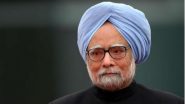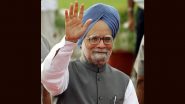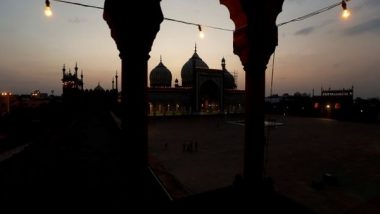Melbourne, March 6: Contrary to what is being fed in international media about India, the freedom of religion is alive and well in India, writes Salvatore Babones, an associate professor at the University of Sydney in Quadrant Online.
He cracked open the conspiracy by the West to manufacture the impression that democratic India has become a kind of Hindu Rashtra (nation). Recently, in January this year, BBC released the documentary film titled 'India: The Modi Question," which features the Gujarat riots of 2002. The film caused controversy for alluding to the leadership of Modi as chief minister during the riots while disregarding the clean chit given by the Supreme Court. Right to Freedom of Religion Doesn’t Include Fundamental Right To Convert People, Centre to Supreme Court.
Targeting the UK, Babones cited the example of an arrested 45-year-old woman in Birmingham on December 6, 2022 for praying silently, while in India, people of many different religions regularly pray in public, often very loudly. Freedom of Religion Bill 2020 Approved by Shivraj Singh Chouhan in Madhya Pradesh; Know Rules, Penalties and Jail Term of the Dharma Swatantrya Bill 2020.
"In a country where most elections are decided on razor-thin margins, people with complaints about religious discrimination or harassment don't have to turn to the US State Department for help. The ballot box offers a surer, swifter, more immediate redress," said Babones.
"If any country could be suspected of harbouring a social hostility to religion, it might be today's largely atheistic United Kingdom," he added. However, according to the highly-respected Pew Research Center, the worst country in the world for social hostility to religion is ... India, reported Quadrant Online.
Notwithstanding their own surveys showing that "the vast majority of Indians say they are very free today to practice their religion" and "relatively few Muslims say their community faces 'a lot' of discrimination" in the Hindu-majority country, Pew rated India the worst country in the world for "acts of religious hostility by private individuals, organizations or groups in society".
The Pew Research Center because of its perceived objectivity has become an institutional target for the opponent of India. Other targets include the United States Department of State's Office of International Religious Freedom (OIRF), the American government-sponsored United States Commission on International Religious Freedom (USCIRF), the semi-official American think tank Freedom House, and the United Nations Office of the High Commissioner for Human Rights (OHCHR).
India is the world's largest democracy, accounting for roughly half of the world's people who are able to voice their opinions in free and fair elections, said Babones.
The poorly constructed methodology of Pew's Social Hostilities Index all but ensures that India will perform badly on the metric - they lack sufficient empirical evidence to be convincing.
One such narrative has been put forward by a loose grouping of humanities scholars centered on an organisation called the South Asia Scholar Activist Collective (SASAC).
At the core of the SASAC scholars' intellectual program is the stigmatisation of the concept of "Hindutva."In India, Hindutva is closely associated with the Bharatiya Janata Party (BJP), the party that has governed India since 2014.
The BJP insists that "Hindutva accepts as sacred all forms of belief and worship", and in this context, it should be noted that the English words 'Hindu' and 'India' are derived from the same Sanskrit root, reported Quadrant Online. The SASAC scholars routinely characterise Hindutva in terms that closely resemble those used by anti-zionists to characterise Zionism.
Needless to say, neither Hindutva nor Zionism has anything in common with the fascism described by Benito Mussolini in his Doctrine of Fascism or the Nazism described by Adolf Hitler in Mein Kampf. Those who oppose Hindutva, like those who oppose Zionism, tend to use these morally-weighted terms not as precise descriptions of political philosophies, but as generic political insults, said Babones.
Opposition to Hindutva is, in itself, a legitimate political position, both within India and abroad. But as with academic antizionism, it is the extreme emotional intensity of much Western academic opposition to Hindutva that suggests that some of it may be motivated by factors other than intellectual idealism.
(This is an unedited and auto-generated story from Syndicated News feed, LatestLY Staff may not have modified or edited the content body)












 Quickly
Quickly





















